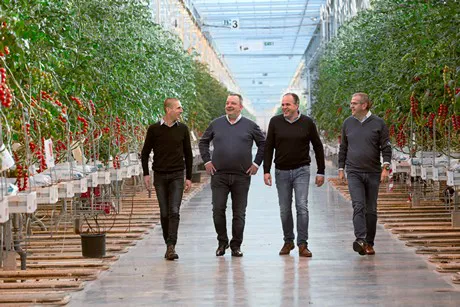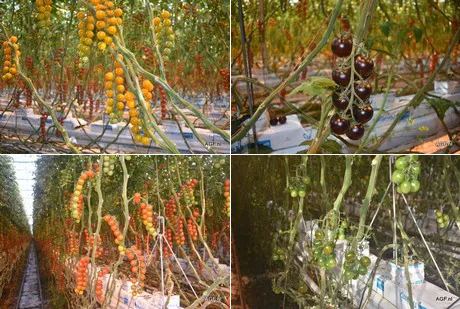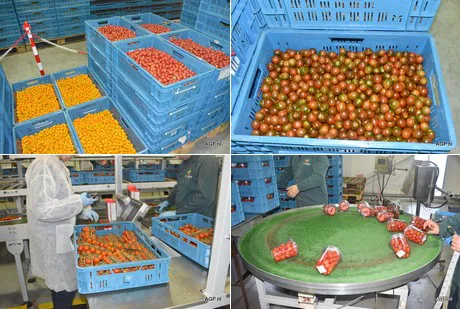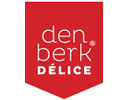Last December, Den Berk Délice opened a new cultivation location in Merksplas, ‘Den Horst’. The company is currently investing in a further expansion of 10 hectares of greenhouses with LED lighting to deliver the same taste and quality 365 days a year.
“In Rijkevorsel, 10 hectares are being added and the total area is therefore about 60 hectares of speciality tomatoes. There is still space to expand to 70 hectares," says Loes van der Velden of Den Berk Délice. “Our ambition is not to be the largest, but to grow the tastiest tomatoes. And we want to be able to respond to the demand of the market."
For the extension of 10 hectares, Den Berk Délice is investing in LED lighting. Luc Beirinckx (Co-manager): “Thanks to assimilation lighting, we can deliver the same quality and taste in the winter months as in summer. LED lighting requires a huge investment of € 2,800,000, but it is an energy-efficient light source, which means that we need much less energy to achieve the same production."
"Cooperation with Coöperatie Hoogstraten offers strong added value"
Despite the fact that Den Berk Délice is a strong brand within the taste tomato market, Coöperatie Hoogstraten still offers great added value for the cultivation company. “Our tomatoes are all sold through Coöperatie Hoogstraten. Every grower within the Coöperatie can specialize in his or her product without competing with each other. This means that together with Hoogstraten we form a strong party with an extensive assortment of quality products. The sales team of Coöperatie Hoogstraten also has a great deal of knowledge of the fruit and vegetable market, so that we can only strengthen each other ”, says Loes.
The tomatoes from Den Berk Délice are sold throughout Europe and to a limited extent outside Europe, but mostly in Belgium, Scandinavia and Germany. “For us, the focus for the coming years is primarily on Europe, because there is still much room for growth. We only produce in Belgium and have no production sites elsewhere in Europe. We do this on purpose. Our vision is entirely based on taste and quality and in this way we can manage the entire process under the leadership of the same team in order to guarantee the constant taste and quality of the tomatoes.”

Challenge
Despite the unrest in the tomato market due to the tomato virus ToBRFV, there are as yet no known cases of infection in Belgium. “In Belgium, no infected plants have been found yet, but we are still taking the right measures to keep this virus outside the greenhouses. One could not even imagine that the company would be affected by the virus," says van der Velden.
“What will become a challenge in the future though is finding suitable employees. Even with a pleasant working atmosphere it still remains difficult to find people. Many labor migrants work for us, but when things keep on improving in their home country, fewer and fewer of them are coming here to work. We do look for solutions such as picking robots, but currently human hands are still better able to do the work.”
More production with less environmental impact
Sustainable entrepreneurship is an important aspect within Den Berk Délice. “We strive for more production with less impact on the environment. We generate our energy ourselves with the help of a cogeneration plant (CHP). This used to be done with gas boilers. With a CHP, 43 to 45% of the energy (natural gas) is converted into electricity and the generated heat is used to heat our greenhouses. The released flue gasses are purified and from this we filter the CO2 that is used as a food source for our plants. A CHP saves +/- 35% energy compared to separated generation as was done in the past,” according to the managers.
Anti-reflection and diffused glass
Den Berk Délice has invested in the new greenhouses by using anti-reflection and diffuse glass. This glass ensures that on the one hand, more light enters and on the other hand that the light is more dispersed for better absorption by the plant. With the same input of energy and nutrients, a 10% higher production on the same area is achieved. Rainwater that falls on the greenhouses is collected in large basins to be given to the plants. This rainwater is disinfected by heating (heat from the CHP). The water that the plant does not absorb is collected and re-heated, which means that the entire irrigation system is closed and circulated completely. There is also a strong commitment to biological and integrated control in order to protect crops against diseases and pests.
For more information:  Loes van der Velden
Loes van der Velden
Den Berk Délice
Berkelaar 10
BE 2330 MERKSPLAS
T +32(0)14 40 72 40
loes@denberk.be
www.denberk-delice.com
